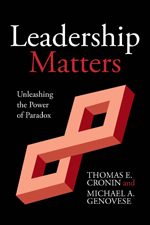Thomas E. Cronin and Michael A. Genovese. Leadership Matters: Unleashing the Power of Paradox. Boulder, CO: Paradigm Publishers, 2012.
 This book has got to be good; it has received thumbs up from several of the giants of leadership theory: Bennis, Burns, O’Toole, etc. Basically the message is that leaders are responsible for getting things done with the collaboration of others through the development and communication of vision, purpose and energy into an “enterprise.” The authors challenge common myths of leadership:
This book has got to be good; it has received thumbs up from several of the giants of leadership theory: Bennis, Burns, O’Toole, etc. Basically the message is that leaders are responsible for getting things done with the collaboration of others through the development and communication of vision, purpose and energy into an “enterprise.” The authors challenge common myths of leadership:
• Leaders are born, not made.
• Leaders is a rare and uncommon talent.
• Leaders are necessarily charismatic.
• Leadership is found only at the top of an organization.
• Office holders are necessarily leaders.
• Organizational or group members are either leaders or followers.
• Leaders are smarter and more creative than most of us.
• Power is the dominant currency of leadership.
Can’t you just feel the stone walls of leadership theory crumbling down to expose the fragmentation of the leadership enterprise?
The authors address these through the following themes:
• Leadership matters. And it is most often about teams or political movements, not about individual heroes.
• Leadership continues to be hard to define. It is hard to measure because it is composed of purpose, process, product, decisions, implementation, and artistry.
• Leadership has to do with reconciling diverse values, interests, and ambiguities.
• Leadership requires a combination of optimism and skepticism, strength and compassion, leveraging quantitative information and intuition.
• Leadership can be learned.
Their discussion is built on a series of leadership contradictions and paradoxes:
• ”We want decent, just, compassionate, and moral leaders, yet at times we admire and need tough, assertive, cunning, manipulative, and even intimidating leaders.” Their point is that the term leader can be applied to just about any form of behavior that serves their own and some others’ purposes.
• “Effective leadership involves self-confidence, the audacity of hope, and sometimes even a fearless optimism. However, humility, self-doubt, and self-control are also essential.” Remember, they have indicated that no one person need have all of these, all of the time.
• “Leaders must be representative—yet not too representative; they need to consult and engage followers, and they need to respond to them. Yet they also must educate, motivate and unlock the best in everyone.” Thank good the must of the heroic leader has been called out!
• “Leaders invent and reinvent themselves. Their leadership usually is intentional, not accidental. Yet people also want their leaders to be open, relaxed, “authentic,” sincere, spontaneous, and to somehow emerge from within rather than be imposed upon a group.” Sees like non sequitors in here some where.
• “Leadership often calls for intensity, enthusiasm, passion, dramatization and self-promotion—yet too much highly personalized volcanic energy can paralyze an organization. Too much of a ‘cult of personality’ can create dependence or other organizational dysfunctions.” It is just not clear who is doing this calling. And there are many voices. Are they calling for different things at the same time?
• “Leaders need to unify their organizations or communities through effective negotiation and alliance building, yet leaders also have to sir things (3) up and jolt their organizations out of complacency. In short, we ask them to be uniters and dividers.” Shiva, where are we when we need you.
• “Leaders are supposed to lead, not follow the polls, yet they are often followers as much as they are leaders…” Why do we insist on labeling people with roles, like leader and follower. Much of the confusion would go away if we saved those labels for roles and focused more on individuals. An individual moves in and out of leader and follower roles!
• “[F]or most of our organizations most of the time, we still want to believe leaders make a significant difference—yet idealistic and romantic theories exaggerate the impact of leaders. Most of the time, ‘leaders’ are agents of their organizations or are at least shaped by them more than they are agents of change.” Our language continues to get in the way of clarity. Is a “leader” a leader if they are following or being shaped by others? (4)
Despite my remarks above, I recognize that these authors are struggling to make sense out of a difficult situation with regard to the use of terms in relation to leadership. First, they have bought into the idea that no general theory of leadership is likely to be developed. This is not a surprising conclusion given the confusion of language. Yet we can never appreciate leadership as a transdisciplinary field of practice, development and theory until we are willing to embrace, potentially temporarily, a meta framework that organizes and/or integrates the paradoxes they have identified and more while allowing for us to learn from specific cases and patterns within and across contexts.
Until leadership theorists are willing to work with this idea, books like Leadership Matters—books of scholarship and reflection—shall continue to distort our understanding. This book may be a step forward toward that.
